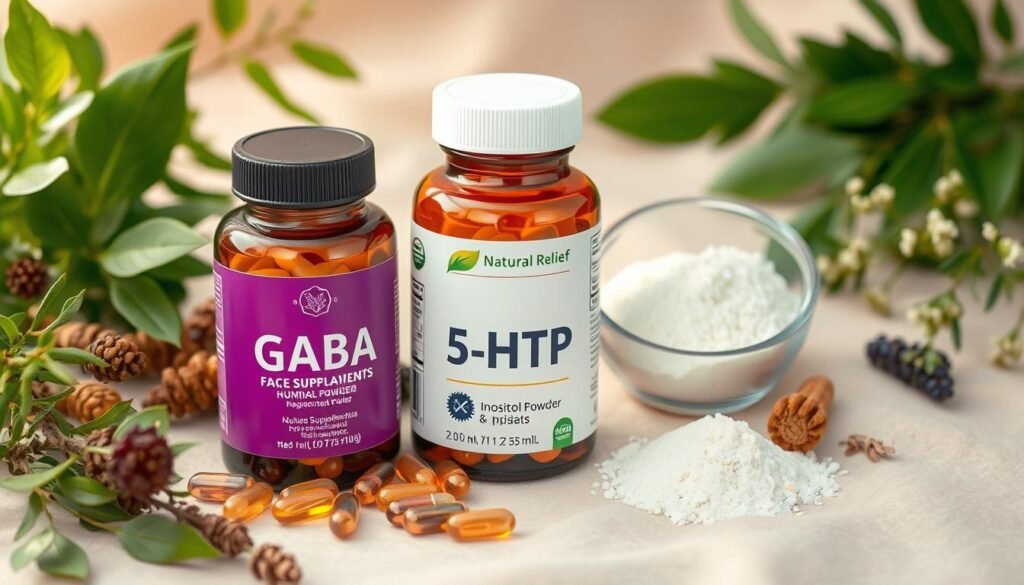Do you wonder if nature holds the key to anxiety relief, instead of standard meds? About 31% of adults will face anxiety at some point. Many seek the top supplements for calming their symptoms and boosting mental well-being. This guide will cover natural options like herbs, vitamins, and minerals known to help lessen anxiety. Ashwagandha and omega-3s are showing positive effects, but be cautious. Always talk to a doctor before trying these natural remedies. To dive deeper, you might find this resource on top anxiety supplements really handy.
Key Takeaways
- Anxiety disorders impact around 31% of adults over their lifetime.
- Natural remedies can effectively complement traditional anxiety treatments.
- A variety of supplements, such as ashwagandha and omega-3 fatty acids, have been linked to anxiety relief.
- Consulting a healthcare professional is essential before starting any supplement regimen.
- Finding the right approach to mental health may require a combination of strategies, including supplements and lifestyle changes.
Understanding Anxiety Disorders
Anxiety disorders include conditions with high fear or anxiety. About 33% of people will face an anxiety disorder in their life. These are not just worries but have distinct symptoms of anxiety.
Generalized anxiety disorder (GAD), panic disorder, and social anxiety are common types. Each has unique symptoms like racing thoughts and sleep problems. About 6.8 million Americans have GAD alone.
There are various treatments focusing on the root causes. Lifestyle changes, therapy, and natural supplements help a lot. Vitamins D and B12, along with magnesium, are beneficial for mental health.
Magnesium might improve anxiety, while Vitamin D may help those with anxiety disorders. It’s key to know the symptoms of anxiety to get the right treatment. Each disorder shows different signs. Cognitive behavioral therapy (CBT) is a top long-term therapy, but some avoid it due to medication side effects.
“Studies with natural remedies like chamomile and omega-3s showed less anxiety. This offers hope for those suffering from anxiety disorders.”
Understanding anxiety disorders means recognizing their complexity. It’s about looking at both standard and alternative treatments.
Natural Remedies for Anxiety: An Overview
Anxiety disorders can really affect your life. These include problems like generalized anxiety disorder and phobias. Many people look for natural ways to feel better. They use herbs, exercise, medication, and smell-good oils to manage their anxiety.
Exercise is a big help. Being active can lower anxiety and make you feel good. Herbal remedies, like chamomile and lemon balm, are also calming. Chamomile helps with anxiety disorder, and studies say lemon balm reduces anxiety symptoms.
Hemp-derived CBD oil is another option. It has less than 0.3% THC. Weighted blankets can provide comfort and reduce anxiety through pressure. But, stay away from alcohol and cigarettes; they might seem to help at first but can make things worse later.
Be careful with some herbs, like kava. It can hurt your liver, and the FDA has warned against using it. Valerian root has shown mixed results. It’s important to know that not all herbal remedies are checked for safety. Always talk to a doctor before trying them, especially if you’re taking other meds.
Cognitive behavioral therapy works well, too. It helps you understand and change your thoughts and actions related to anxiety. Using natural remedies along with it can be effective. We should keep studying herbs to make sure they are safe and work well for anxiety.
| Natural Remedy | Effectiveness | Cautions |
|---|---|---|
| Chamomile | May help with generalized anxiety disorder | Possible bleeding risk with blood thinners |
| Lemon Balm | May reduce anxiety symptoms | Moderate research available |
| Hemp-Derived CBD Oil | Popular for anxiety treatment | Consult with a healthcare provider |
| Kava | Associated with liver damage | Warnings from FDA |
| Valerian | Mixed results for effectiveness | Use with caution |
| Weighted Blankets | Reported benefits for symptoms | Individual experiences may vary |
Best Supplements for Anxiety
Many people seek ways to handle anxiety, especially when 44% of U.S. adults face it. Herbal supplements for anxiety have become popular. They come in many forms, each offering different advantages. Knowing about them helps in choosing the best supplements for anxiety.
Herbal Supplements and Their Efficacy
Herbal supplements are a natural way to tackle anxiety. Kava and passionflower are interesting, though kava has some liver risks. Passionflower might help but needs more proof. Valerian and chamomile are options too, with calming effects and some support for anxiety relief.
- Kava: Small positive effects, risk of liver damage.
- Passionflower: Some small studies indicate benefits.
- Valerian: Mixed results; offers various consumption forms.
- Chamomile: Promising calming properties but may cause allergies.
- Lemon Balm: Preliminary studies show stress relief potential.
Vitamins and Minerals to Consider
Vitamins also play a big role in fighting anxiety. A lot of Americans don’t get enough magnesium, which is key for reducing anxiety symptoms. Vitamin D and omega-3 fatty acids also show promise in anxiety relief. It’s important to get enough of these nutrients for those looking for the best supplements for anxiety.
| Supplement | Recommended Daily Dosage | Potential Benefits |
|---|---|---|
| Magnesium | 310-420 mg (adults) | Improves anxiety, promotes relaxation |
| Vitamin D | 600-800 IU (adults) | Supports mental health, reduces anxiety symptoms |
| Omega-3 Fatty Acids | 250-500 mg (EPA + DHA) | Helps reduce anxiety and improve mood |
Picking the right herbal supplements for anxiety and key vitamins and minerals is a big step toward mental health. Always talk to a healthcare provider to make sure your choices are safe and right for you.
Ashwagandha: The Adaptogenic Hero
Ashwagandha is a key adaptogenic herb known for its ashwagandha benefits. It’s great for stress and anxiety relief. This herb comes from the roots of the Withania somnifera plant. It’s used to boost health and vitality. Studies show it can lower cortisol levels, helping with anxiety.
Health Benefits and Usage
Ashwagandha’s benefits are not just about stress. Studies show it can lower cortisol, which stress increases. One study in the Indian Journal of Psychological Medicine found that 300mg of ashwagandha root extract twice daily reduced cortisol.
The usual dose for ashwagandha for anxiety is about 800 milligrams daily, in two doses. Always talk to your doctor to find the right dose for you. Ashwagandha also helps with brain function and energy because of its iodine. 
Ashwagandha also helps with weight control and mental clarity. People say they feel more energetic and clear-minded after a month. They notice better moods and energy, showing how this herb can improve life.
| Component | Amount per 2 Gummies |
|---|---|
| Pantothenic Acid (Vitamin B5) | 2 mg |
| Iodine | 50 μg |
| Ashwagandha KSM-66® Extract | 300 mg |
| Concentrace® Trace Minerals | 10 mg |
When using ashwagandha, it’s important to stick to the recommended usage. Taking too much can cause a laxative effect. If you are pregnant, breastfeeding, or on medication, talk to a doctor first. Using ashwagandha naturally can help with anxiety and improve well-being.
L-Theanine: A Calming Amino Acid
L-theanine is a special amino acid found mostly in tea leaves like green and white tea. It helps with amino acids for mental health. It is good for reducing anxiety symptoms. L-theanine can also make your sleep better, lower stress, and make your mind clearer. It is great for those looking for a natural way to ease anxiety.
A study in 2019 found that L-theanine works well with GABA to help you sleep longer and better. Many people feel less stressed after using L-theanine for four weeks. You should take about 200 to 500 milligrams a day for the best results.
L-theanine also helps you think better, especially if you take it with caffeine. This combo makes you more alert and focused without feeling shaky. It’s perfect for those who need to relax but still get things done.
It’s usually safe for most people to take L-theanine. But, you should talk to a doctor before you start, especially if you’re on other medications or have health issues. If you’re pregnant or breastfeeding, be more careful since not much research has been done in these groups.
Make sure you buy a good quality L-theanine supplement. The U.S. Food and Drug Administration doesn’t check these products. Choose ones without extra fillers to get all its benefits, like easing anxiety symptoms.
For more on natural supplements for anxiety, read this detailed guide.
Omega-3 Fatty Acids for Mental Health
Studies show omega-3 fatty acids are key for mental health. They’re found in many mental health supplements. They help with anxiety and depression, especially in the young. It’s important to get enough omega-3s for better well-being.
Sources and Recommended Doses
Eating omega-3-rich foods has big benefits. You can get these essential fats from:
- Fatty fish such as salmon, mackerel, and sardines
- Flaxseeds and flaxseed oil
- Walnuts
- Chia seeds
- Algal oil, a vegetarian source
If you’re not eating these foods, think about supplements. Omega-3 capsules usually have 300mg-600mg of DHA and EPA. This can help young people, from 14 to 24, with their mental health. Many mental health issues start early.
Before adding supplements, talk to a doctor, especially if you take medicines like blood thinners. Omega-3s might affect how these treatments work.

| Source of Omega-3 | Omega-3 Content (mg per serving) | Notes |
|---|---|---|
| Salmon (3 oz) | 1,500-2,000 | Rich in EPA and DHA |
| Flaxseeds (1 oz) | 2,300 | High in ALA, a plant-based omega-3 |
| Walnuts (1 oz) | 2,600 | Good source of ALA |
| Sardines (3 oz) | 1,200-1,500 | Convenient and economical |
| Chia seeds (1 oz) | 5,000 | Excellent vegetarian source |
Magnesium: The Essential Mineral for Stress Relief
Magnesium is key for mental health, helping with stress relief and happiness. A 2017 review showed magnesium lowers anxiety well. It’s not just a supplement; it’s a crucial nutrient for relaxation and mental wellness.
Adults need about 310 to 420 mg of magnesium daily, but many don’t get enough from food. Leafy greens, nuts, seeds, and whole grains are good sources. Some might need supplements to reach their magnesium goals. Studies on magnesium and anxiety often use doses from 75 to 360 mg daily.
Choosing the right magnesium type for stress relief supplements matters. Magnesium glycinate is favored for its calming brain effects. Magnesium oxide is less absorbable and might not work as well. Taking magnesium L-threonate has shown to lower anxiety, proving good at crossing into the brain.
It’s important to stay within safe magnesium limits. Taking more than 350 mg in supplements may cause issues like diarrhea or worse. Always talk to a doctor for the best magnesium amount for you, especially when considering other medicines.
| Magnesium Form | Absorption Rate | Common Uses |
|---|---|---|
| Magnesium Glycinate | High | Anxiety relief, calming effect |
| Magnesium Citrate | Moderate | Constipation relief |
| Magnesium Oxide | Low | General supplementation |
| Magnesium L-Threonate | High | Brain health, anxiety reduction |
Magnesium is vital for natural anxiety management. Used wisely within a full care plan, it improves mental health and relaxation. For more info, see this detailed overview of magnesium supplements.
Valerian Root: Nature’s Sleep Aid and More
Valerian root is getting more popular as a natural remedy. It’s mainly used by those who struggle with sleep and anxiety. This herb, from the Valeriana officinalis plant, has been used in Europe for a long time to aid sleep.
Research shows that valerian root can help you fall asleep faster and improve sleep quality. People often feel more rested and spend more time in deep sleep stages. However, the full benefits usually show after using it for two weeks or more. Good sleep habits, like avoiding caffeine before bed, also matter a lot.
Some people may experience dizziness, headaches, or stomach problems with valerian root. It should be avoided by pregnant or nursing individuals, young children, or those with liver problems. These sleep aids are not FDA regulated, so talking to a doctor before use is key.
American Academy of Sleep Medicine warns against using natural sleep aids like valerian for long-term insomnia. They suggest it may not be safe or effective over time. Combining it with cognitive therapy and seeing healthcare pros often works better for anxiety and sleep issues.
| Aspect | Details |
|---|---|
| Common Uses | Natural sleep aid, anxiety relief |
| Study Findings | May improve sleep quality, reduce sleep onset time |
| Recommended Dosage | 300 to 600 mg per day |
| Potential Side Effects | Dizziness, headaches, gastrointestinal issues |
| Precautions | Consult healthcare provider, especially for pre-existing conditions |
Valerian root for anxiety is part of a bigger conversation about community support. For more on this, you can check out local resources and support groups.
Chamomile: More than Just Tea
Chamomile is well-known for reducing anxiety symptoms. It is most commonly enjoyed as tea. This provides not only a calming experience but also offers promising benefits for anxiety relief. A review shows that about 90% of studies confirm chamomile can help lower anxiety.
Benefits and Risks of Chamomile
About 301 million people worldwide suffer from anxiety. For them, chamomile for anxiety could be a natural option. It has proven effective in the short term and helps with relaxation. However, chamomile has its risks too. It can interfere with some medications, like blood thinners, raising the risk of bleeding.
Also, chamomile might cause allergic reactions, such as allergic eczema and drowsiness. So, people should use it cautiously.
- Primary Benefits:
- Reduction of anxiety symptoms.
- Potential enhancement of mental well-being.
- Pleasant herbal tea experience without caffeine.
- Potential Risks:
- Allergic reactions, particularly in sensitive individuals.
- Interactions with medications such as sedatives and NSAIDs.
- Long-term effects remain unclear, warranting consultation with a healthcare professional.
Before using chamomile daily, talking to a healthcare provider is key. Especially for those already on medications or with health issues. This ensures its safe and right for them. For more info on chamomile’s effectiveness, check out this study.
Other Notable Supplements for Anxiety
Many people look for ways to ease their anxiety. They try different supplements, each with special benefits. GABA, 5-HTP supplements, and inositol stand out. They each have unique ways to boost emotional health. This knowledge helps those seeking natural anxiety relief find the right path.
GABA and its Role in Emotional Well-being
GABA, or gamma-aminobutyric acid, helps bring calm and relaxation. It slows down brain activity, which can ease anxiety symptoms. Studies show that more GABA may reduce stress and make your mind clearer. There are many products designed to increase GABA. This makes it a top choice for those wanting a natural way to handle anxiety.
5-HTP: A Precursor to Serotonin
5-HTP, or 5-hydroxytryptophan, is a step towards making serotonin. This brain chemical is key to controlling mood. Research says 5-HTP supplements might help with anxiety and improve mood. By boosting serotonin in the brain, it could help with anxiety disorders. Users often feel happier and more stable after using 5-HTP regularly.
Inositol: A Unique Approach to Mental Balance
Inositol is gaining recognition for its mental health benefits. Studies suggest it can cut down anxiety, even compared to usual meds for panic issues. It helps with serotonin signaling, adding to emotional steadiness. Using inositol could help your mental health and calm you down.

Consulting with a Healthcare Professional
Anxiety is complex, especially for those dealing with it daily. About 6.8 million Americans live with generalized anxiety disorder. It’s important to seek guidance from a healthcare professional for it. They can offer personalized advice and recommend the best treatment options.
Talking to a healthcare professional before starting new supplements is crucial. This is very important for people with health issues or on other meds. Some supplements can cause problems when mixed with certain medicines.
Studies show that nutrients like vitamin D and magnesium can help with anxiety. Not having enough magnesium might make anxiety worse. A healthcare professional can check your needs and suggest the right supplements plan. For more about how vitamins help with anxiety, go to this link.
Doctors can also say if omega-3 fatty acids or probiotics could help you more. Because everyone is different, it’s key to find what works for each person uniquely.
Taking these steps is safe and aims for a well-rounded way to handle anxiety. It helps improve overall well-being.
Conclusion
Numerous natural supplements and remedies show promise for those struggling with anxiety. About 6.8 million Americans battle with generalized anxiety disorder. Finding safe, effective alternatives is critical. Ashwagandha and St. John’s Wort are among the supplements that have positive results in studies. Research shows that 71% of herbal supplements can help lessen anxiety symptoms.
While these natural remedies are helpful, they shouldn’t replace professional medical advice. Cognitive Behavioral Therapy (CBT), for example, has a high success rate in treating anxiety. It’s also crucial to mix different treatment methods. Remember, most side effects from these studies were mild. But it’s always safe to talk with a healthcare provider before trying new treatments.
As cases of anxiety and depression increase, combining traditional and complementary methods is key. With the right information, people can choose the best options for their mental health. This way, they can improve their mental well-being effectively.